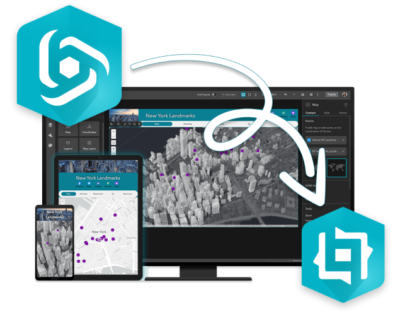
ArcGIS Web AppBuilder (WAB) is a GIS application that was introduced in 2014 by Esri in response to the increasing need for user-friendly web-based mapping tools. It has played a pivotal role in the advancement of configurable GIS web applications, allowing non-developers to build and deploy 2D and 3D geospatial web apps without writing a single line of code, while also allowing traditional developers to extend and customize the application. Web AppBuilder is a truly innovative application that revolutionized the process of creating and deploying interactive mapping applications across numerous industries, including urban planning, natural resource management, and so many more. As of February 2023, however, Esri has officially announced the retirement of ArcGIS Web AppBuilder for developers.
First introduced in 2014, ArcGIS Web AppBuilder features a notable innovation in the form of widgets. These widgets provide both out-of-the-box functionality and the ability to customize and extend capabilities to suit specific requirements. The creation of a mapping application using WAB involves integrating various components such as geospatial data, data storage and management, mapping APIs, UI/UX design, authentication and authorization, sharing and collaboration features, and customization options. These components come together to create a comprehensive and user-friendly tool for visualizing, analyzing, and sharing spatial information products.
For users with more programming experience, Web AppBuilder for Developer edition also allows for custom widget development using JavaScript, HTML, and CSS, while providing GIS users and developers with the flexibility to extend the functionality of apps to suit their unique requirements.

As of February 2023, Esri has officially announced the retirement of ArcGIS Web AppBuilder for developers. The Developer Edition of Web AppBuilder will retire in July 2024, Web AppBuilder for ArcGIS Enterprise will have its final release in the first half of 2025, and Web AppBuilder in ArcGIS Online will retire in the fourth quarter of 2025. Applications that have been built using Web AppBuilder will continue to work, but developers who are looking to create new web maps using Esri’s tools are encouraged to explore the features and capabilities of the ArcGIS Experience Builder (EB).
ArcGIS Experience Builder is a web-based tool that allows developers to easily create custom web mapping applications without needing extensive coding experience. It offers a range of templates and widgets that can be used to build apps that include maps, charts, and other data visualizations. The evolution from ArcGIS Web AppBuilder to ArcGIS Experience Builder represents a shift towards more modern and dynamic web mapping experiences that provide greater customization, interactivity, and engagement for end-users.

Providing users with the ability to leverage advanced features such as 3D capabilities, virtual reality (VR) and augmented reality (AR) capabilities, seamlessly integrating with Esri and other third-party applications, and the assurance of continued support.
In light of the retirement of ArcGIS WebAppBuilder, Esri has encouraged users to begin migrating their projects to ArcGIS Experience Builder. The migration of an ArcGIS Web AppBuilder application to ArcGIS Experience Builder is a pretty straightforward process. It involves creating a new project in Experience Builder and then importing the necessary components from the Web AppBuilder application. Here are the basic steps to migrate an ArcGIS Web AppBuilder application to ArcGIS Experience Builder:
Note that the migration process may require some adjustments and troubleshooting to ensure that the application works seamlessly in ArcGIS Experience Builder. Additionally, some Web AppBuilder components may not have a direct counterpart in ArcGIS Experience Builder, so you may need to find alternative solutions or workarounds. Check out Esri’s migration video for additional migration details, and their ArcGIS Experience Builder 2023 Roadmap to help make better decisions regarding migration strategies.
While the retirement of ArcGIS Web AppBuilder may be a disappointment for some developers who were familiar with and enjoyed using it, ArcGIS Experience Builder offers many new features and capabilities that make it an attractive new information product for those looking to create web mapping applications.
Whether you’re just starting with ArcGIS Experience Builder or looking to migrate from ArcGIS Web AppBuilder, don’t hesitate to reach out to our team of experts for support and guidance! Start a conversation today!